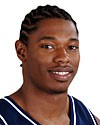Fendi Onobun learned Monday that the publication of a book he had been working on with his name attached to it could violate an NCAA rule and cost him his eligibility.
NCAA bylaw 12.5.2.1 states that the use of Onobun’s name and photo to promote the book would constitute profiting off his status as a student-athlete, which is not allowed.
Onobun, a forward on the men’s basketball team, had been working with five other sophomores on a how-to book entitled “”The Nerdy McFly Manifesto.””
“”We never felt that we needed his involvement with Arizona basketball to further expose our ideas of ‘Nerdy McFly,’ “” co-author Rafael Morales said. “”This is just a creation of six diverse students that attend the university.””
When the NCAA learned of the book from an article published April 18 in the Arizona Daily Wildcat, it notified Bill Morgan, associate director of athletics for compliance, and cited the bylaw.
Morgan then left a voice message for Onobun on his cell phone while he was in class to inform him of the rule infringement, Onobun said.
Because the book has not yet been published, and thus has not produced financial compensation, Onobun’s eligibility remains intact. The book can still be published and Onobun can stay eligible to play basketball as long as there are no traces of his name or photo within the book or in its advertisement.
“”The name belongs to (Onobun), and if he uses it for profit, he is a professional (and) then the NCAA will take away his eligibility,”” Morgan said Monday as a copy of the Wildcat article lay on his desk in front of him with Onobun’s name highlighted in yellow. “”He can use a pseudonym, but if anyone indicates that that pseudonym is Fendi Onobun (within the book or in advertisement), then we’ve got a problem.
NCAA Division I bylaw 12.5.2.1: “”Advertisements and Promotions Subsequent to Enrollment””
Subsequent to becoming a student-athlete, an individual shall not be eligible for participation in intercollegiate athletics if the individual:
(a) Accepts any remuneration for or permits the use of his or her name or picture to advertise, recommend or promote
directly the sale or use of a commercial product or service of any kind, or
(b) Receives remuneration for endorsing a commercial
product or service through the individual’s use of such product or service.
“”If it has his name, he is ineligible.””
Co-author Bryce Dawson felt the exclusion of Onobun would be unfair.
“”This ruling made by the NCAA only further perpetuates the stereotype that the college athlete is one that is unintelligent and has nothing to say for him or herself,”” Dawson said.
“”In regards to our situation, the ruling is attempting to keep one from helping others through means of our diverse experiences.””
From now on, it’s as if Onobun doesn’t exist, as far as the book is concerned. His name will be wiped out from the book entirely, and his photos taken down from the group’s Web site.
The publication of the book will not credit Onobun for any of his work, a situation Onobun called “”unfair.””
“” ‘Student-athlete’ means that you are a student first and athlete second,”” co-author Egomeli Hormeku said. “”I guess I stand corrected. To take away from one’s scholastic potential places that person in a box of limitation.””
But whether it’s fair or not, the rules must be followed.
“”I support Fendi 100 percent with what he’s doing,”” said Josh Pastner, a men’s basketball assistant coach, “”but we all have to follow the NCAA guidelines.””
Onobun is also banned from participating in community service events that the “”Nerdy McFly”” group is part of. He can only participate in community service if it’s put on by the university and has no affiliation with the group, Onobun said.
“”I’m restricted and I can’t do what I want to do because I am a student-athlete,”” Onobun said. “” ‘Student’ is the first part of ‘student-athlete’ and I can’t even do something scholarly like co-writing a book and get credit for it.””
That credit won’t belong to Onobun until his two years of athletic eligibility are over.
“”He’s an intelligent student-athlete,”” Pastner said. “”Once his eligibility is up, and he can get credit for his work, there is no doubt in my mind that he would make a great author.””









